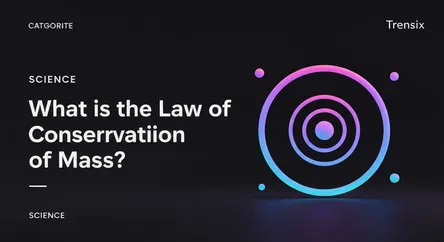Science
What is the Law of Conservation of Mass?

A core principle of science stating that in a closed system, mass is neither created nor destroyed, only transformed from one form to another.
What is it?
The law of conservation of mass is a fundamental principle in physics and chemistry which states that for any system closed to all transfers of matter, the mass of the system must remain constant over time. In simpler terms, matter cannot be created or destroyed. This principle was famously demonstrated by the French chemist Antoine Lavoisier in 1789. In a typical chemical reaction, the mass of the reactants (the starting substances) will always be equal to the mass of the products (the resulting substances). For example, when wood burns, the combined mass of the resulting ash, soot, and gases is equal to the original mass of the wood and the oxygen it reacted with.
Why is it trending?
This law is a cornerstone of modern chemistry and its understanding was a crucial step in the transition from alchemy to quantitative science. It remains a trending topic in education as it is the basis for stoichiometry, the calculation of reactants and products in chemical reactions. Balancing chemical equations, a key skill in chemistry, is a direct application of this law. Furthermore, the principle is vital in environmental science for tracking matter as it moves through ecosystems, such as in the carbon or nitrogen cycles, helping to model and understand our planet's systems.
How does it affect people?
The law of conservation of mass has significant real-world applications. It is essential for industrial and chemical manufacturing to predict the amount of product that will be formed from a certain amount of reactants, ensuring efficiency and cost-effectiveness. On a daily basis, it explains common phenomena like how a candle seems to disappear as it burns (it is converted into water vapor and carbon dioxide gas) or how the food we eat is metabolized into energy and waste products. It also underpins countless processes in engineering, cooking, and even a simple campfire, by confirming that all matter is accounted for, even if it changes state.